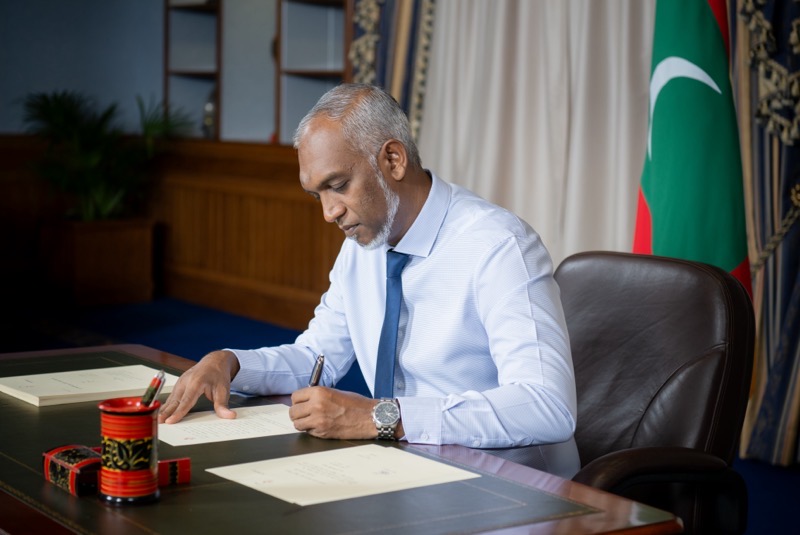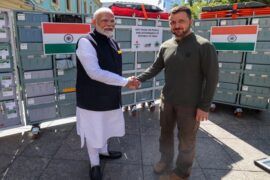Mohamed Muizzu, known for being ‘pro-China,’ was re-elected as the President of Maldives. His party, the People’s National Congress (PNC), won the parliamentary elections in Maldives with a ‘supermajority.’ Having won 71 seats in the 93-seat parliament, Muizzu has a substantial political mandate to overturn significant decisions.
Muizzu’s landslide victory in the archipelago nation is a cause for concern for New Delhi as it will enable him to push policies through the parliament that are not conducive to India’s interests. His victory is particularly significant given the India-China rivalry in the Indian Ocean region.
Last year, Muizzu won the presidential election on an ‘India Out’ campaign. After he took over, Male shifted towards Beijing. Muizzu ordered India’s 88 military personnel and two helicopters stationed on the islands (to be used for medical evacuations) to leave before March 15.
Soon after, Muizzu visited Beijing on his first state visit and signed 20 agreements with China on the economy, trade and infrastructure, irritating India. On his return, he said, ‘We may be small, but this doesn’t give them the licence to bully us.’ While he did not name any country, the remark was seen as a dig at India.
In January, when Modi promoted India’s Lakshadweep Islands on social media, ministers in Maldives saw it as an attempt to divert Indian tourists away from Maldives. Moreover, a trio of deputy ministers posted derogatory remarks, mocking Modi’s attempts to promote Lakshadweep and demeaning Modi, including for his support of Israel.
Their unwarranted comments created a furore. The incident was a major diplomatic issue; India summoned the Maldivian envoy and issued a stern message.
Modi’s online supporters rallied behind him, using hashtags such as #BoycottMaldives and #ExploreIndianIslands. Indian travel businesses, keen to curry official favour, joined in: Indian Chamber of Commerce’s Aviation and Tourism Committee asked trade groups to stop promoting the Maldives in light of ‘anti-India feelings’ voiced by Maldivian officials.
Data from the Maldives Ministry of Tourism shows that the number of visitors from India, formerly its top source of tourists, decreased by 38 per cent in the first quarter of this year to 34,847. However, the number of visitors from China rose 288 per cent to 67,399 during the same period.
India and China have been at loggerheads with each other. In 2020, Indian troops clashed with their Chinese counterparts in eastern Ladakh; over 24 soldiers, mostly Indians, were killed. Since then, both countries have increased their troop deployments at the border, and New Delhi is arming its navy to respond to maritime challenges.
India—a member of the Quad, along with the United States, Japan, and Australia—is drawing closer to Washington, particularly in matters of defence, security and technology. It is seen as an attempt to counter China. However, in countering China, strong relations with regional neighbours are essential. Unfortunately, India’s Neighbour First policy was meant to build robust relations with regional neighbours and did not achieve its stated objectives.
In the last decade, India’s neighbours—particularly Nepal, Sri Lanka, and now Maldives—have leaned towards Beijing. In a significant shift, China took over the Chabahar Port in Iran, previously built and run by India. So is the case with Sri Lanka. Recently, India has voiced concern over the visits of Chinese ‘research vessels’ and infrastructure projects in Sri Lanka. Muizzu’s re-election as the President of Maldives, with a two-thirds majority, is a significant development that India can not ignore.
Maldives must balance its relationship with two big countries in its neighbourhood—India and China—to ensure that the island nation’s interests are not compromised. Maldives must be wary of falling into a debt trap, like many other nations who have done business with China.
India must be agile in building diplomatic bridges with its neighbours. Instead of taking a ‘big brother approach,’ where neighbours feel they are being ‘bullied,’ finding ways to build long-term sustainable diplomatic relations would help. New Delhi must be agile and astute in rebuilding diplomatic goodwill, which has seen significant erosion in the last decade.
-30-
Copyright©Madras Courier, All Rights Reserved. You may share using our article tools. Please don't cut articles from madrascourier.com and redistribute by email, post to the web, mobile phone or social media.Please send in your feed back and comments to [email protected]











